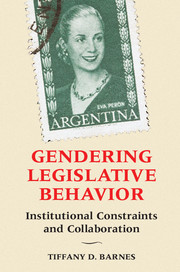Book contents
- Frontmatter
- Dedication
- Contents
- List of Tables
- List of Figures
- Acknowledgments
- 1 Introduction
- 2 A Theory of Legislative Collaboration
- 3 Can Democracy Be Collaborative? Examining Patterns of Collaboration
- 4 Why Do Women Collaborate? Evidence of Women's Marginalization
- 5 When Do Women Collaborate? Explaining Between-Chamber Variation
- 6 When Do Women Collaborate? Explaining Within-Chamber Variation
- 7 Collaboration in a Cross-National Context
- 8 Conclusion
- References
- Index
8 - Conclusion
Published online by Cambridge University Press: 05 June 2016
- Frontmatter
- Dedication
- Contents
- List of Tables
- List of Figures
- Acknowledgments
- 1 Introduction
- 2 A Theory of Legislative Collaboration
- 3 Can Democracy Be Collaborative? Examining Patterns of Collaboration
- 4 Why Do Women Collaborate? Evidence of Women's Marginalization
- 5 When Do Women Collaborate? Explaining Between-Chamber Variation
- 6 When Do Women Collaborate? Explaining Within-Chamber Variation
- 7 Collaboration in a Cross-National Context
- 8 Conclusion
- References
- Index
Summary
Collaboration is an essential component of democracy. It is widespread across legislatures, but some legislators have more incentives to collaborate than others. In particular, legislators who are not in positions of power – such as women – can use collaboration to attain political power and influence the policy-making process. Perhaps this is why most scholarship emphasizes the competitive aspects of democracy, paying little attention to collaboration. When we focus primarily on privileged groups – those groups who designed institutions to benefit themselves – we overlook this aspect of democracy. It is only as we focus on groups that face structural barriers in institutions that the need for collaboration becomes apparent.
Although the incorporation of underrepresented groups into political institutions highlights aspects of the democratic process that are typically overlooked, these underrepresented groups still must function within existing institutions. As such, we can see how institutions structure their distinctive motivations. Patterns of collaboration vary among female legislators because not all women have the same opportunities to work collaboratively. Generally, women's collaboration is more likely to unfold where party leaders exercise weak party constraints over legislative behavior. By contrast, when party leaders exercise strong constraints over legislators’ behavior, women's legislative collaboration is likely to be foiled.
In this concluding chapter, I address questions about how this book's contributions can advance future studies of legislative collaboration beyond women's marginalization, women's rights legislation, women's representation, and collaboration among other historically excluded groups. With respect to legislative collaboration, my theory argues that women are largely motivated to collaborate in an effort to overcome their marginalized status in the legislature and influence the policy-making process. As women make gains in the legislature and begin to achieve equal access to power, will collaboration cease, or is there room to think about collaboration beyond women's collective marginalization? Where the study of women's rights is concerned, what can the theory advanced here help us understand about the progression and success of women's rights agendas? For example, are some institutions more prohibitive to the advancement of women's rights? If so, what can be done to overcome these challenges? Next, I consider the implications of my findings for institutional design.
- Type
- Chapter
- Information
- Gendering Legislative BehaviorInstitutional Constraints and Collaboration, pp. 212 - 236Publisher: Cambridge University PressPrint publication year: 2016



